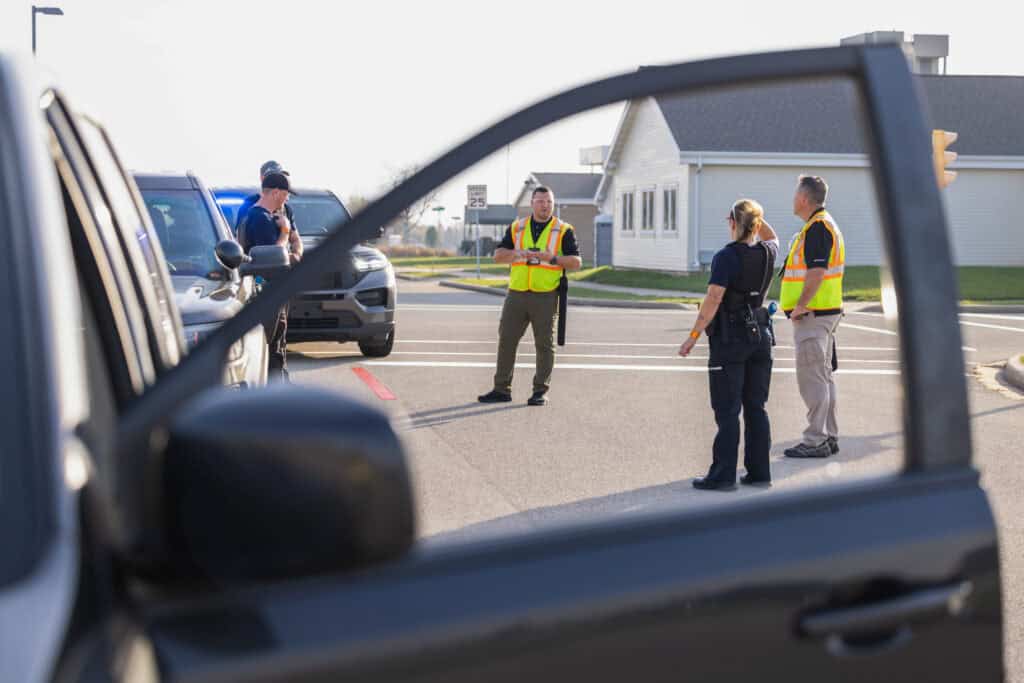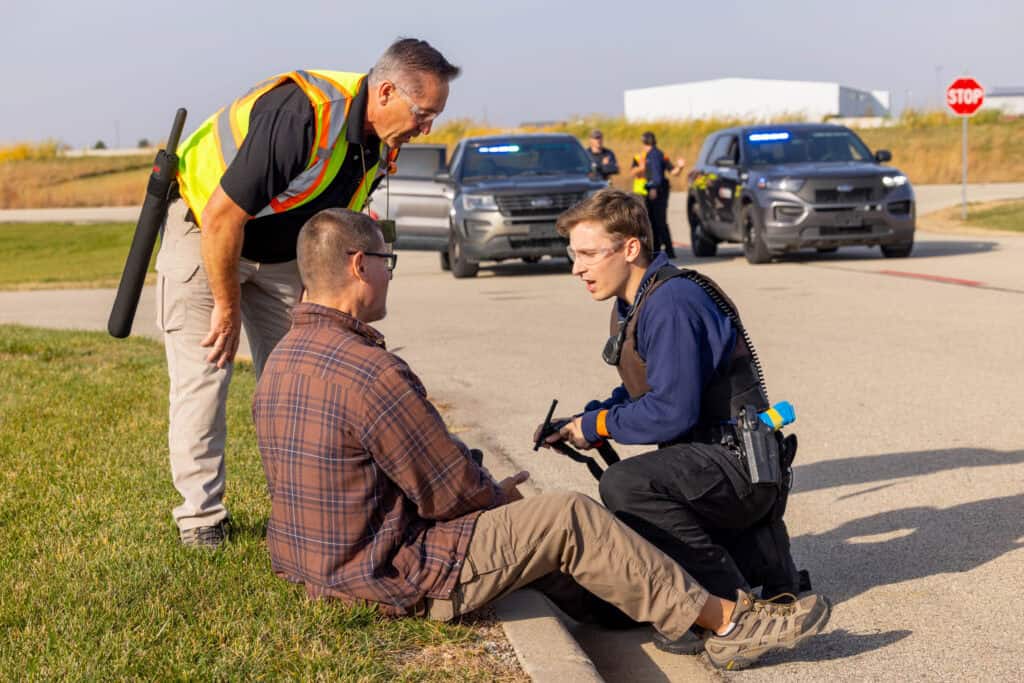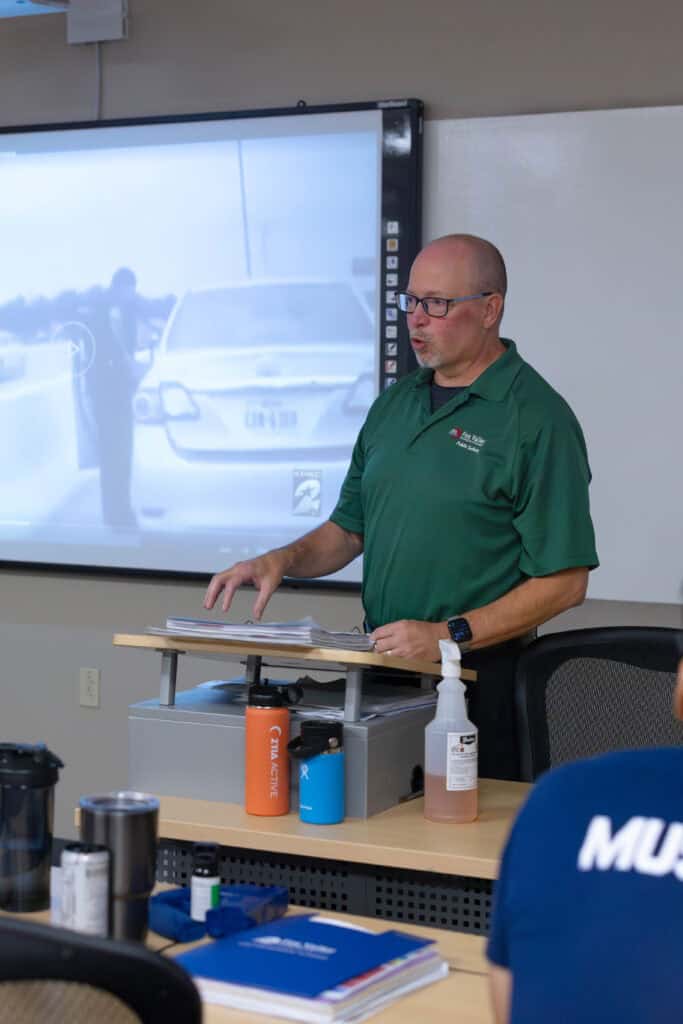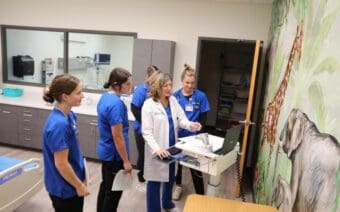
November 18, 2024
APPLETON – For the past 54 years, Fox Valley Technical College’s (FVTC) Law Enforcement Academy has helped train the next generation of law enforcement officers – improving its curriculum, updating its facilities and, in turn, increasing its enrollment along the way.
“The curriculum and training standards are set by the Department of Justice,” Academy Director Tim Hufschmid said. “They’ve increased the hours over the years. I think when I (went through training) it was 400 hours, then it went to 520 hours and now it is 720 hours – which started in 2016.”
A bit of background
Law enforcement training at FVTC – which at the time was called the Fox Valley Technical Institute – got its start in 1970.
Back then, Hufschmid said the academy had just one dedicated classroom and instructors relied on a portion of the campus parking lot to teach vehicle contact scenarios.
“When we did Emergency Vehicle Operations Course (EVOC) training, recruits would practice operating emergency vehicles at different locations away from campus,” he said. “We would move training to the former dog track in Kaukauna, the parking lot at the (Wisconsin) Timber Rattlers stadium or use the driving center on campus when it wasn’t being used by our transportation programs.”
During the first several years of the program, Hufschmid said firearms practice was done in a range in the basement of the college.
Over the years, a variety of areas of the program saw upgrades, Hufschmid said, with the biggest one coming in 2015 with the opening of FVTC’s Public Safety Training Center (PSTC).
At the 80-acre facility, recruits, he said, get hands-on tactical training through defense and arrest tactics rooms, indoor and outdoor firing ranges and the emergency vehicle driving range.
The River City simulated village, Hufschmid said, includes a bar, hotel, mini-mart, houses and a bank where recruits are tested in real-world scenarios.
“Studies have shown scenario training is so important for law enforcement,” he said.

Hufschmid said there are three phases of FVTC’s Law Enforcement Academy.
“At the end of each phase, there’s something called integration exercise and teaching scenarios, and our facility is tailor-made for that,” the FVTC alum said.
When he was a student at the academy, Hufschmid said classrooms served as make-shift training locations.
“We’d go to a classroom and they’d say, ‘Okay, pretend this classroom is a house, and you get dispatched here for domestic,” he said. “Now, we can actually dispatch our students in squad cars to our one-story or our two-story house for a domestic call. We can dispatch them to our hotel bar for a bar fight.”
High demand
The way the academy works, Hufschmid said, is that outside law enforcement agencies can sponsor a student to participate.
“If an agency wants to sponsor a student, they have first shot of getting to the academy over FVTC two-year students,” he said. “When I took over as director of the academy, I would say three-quarters of the academy was self-sponsored and a quarter of academy students were sponsored by an agency.”
Today, Hufschmid said those numbers have flipped.
“I would say 90% of our academy classes are filled by sponsored students, and there’s not a lot of room for FVTC two-year students to get in,” he said.
That, Hufschmid said, prompted FVTC to recently add a fourth academy during the calendar year.
“The demand was so strong,” he said. “We started a fourth academy to provide our two-year students an opportunity to complete the Law Enforcement Academy.”
With the addition of the fourth academy, Hufschmid said there will only be about 21 days this school year (excluding weekends and holidays) when an academy isn’t running at the PSTC.
“We try to plan a couple years out and we have plans to hold a fourth academy for the foreseeable future,” he said. “Once we see that the demand is no longer there, then we can scale back. But yeah, there’s nothing on our radar that says we’re not going to need a fourth academy in the future.”
Each academy, Hufschmid said, has between 24 and 30 students – with more than 110 recruits graduating from FVTC’s Law Enforcement Academy each year.
“Since there is a high demand for officers, I have agencies come into the academy while it’s going on and they try to recruit officers that aren’t hired yet,” he said. “Typically, a majority of our students are hired by their graduation date.”
In the class that started in August, Hufschmid said four students weren’t sponsored by an agency upon entry.
“Two of them have jobs already and it’s my understanding that another one of them is getting close to getting a job,” he said. “So the jobs are out there.”
An effective combo
Hufschmid said the academy’s state-of-the-art facility combined with its majority adjunct instructor teaching staff is what sets FVTC’s program apart.
“I would say 90% of our academy is taught by adjunct instructors, and 10% is taught by full-time instructors,” he said.

These numbers, Hufschmid said, are unique to FVTC.
“That’s not how it’s done at academies across the state,” he said. “We bring in officers that are currently working in the field.”
Hufschmid said this teaching model provides FVTC – the largest provider of law enforcement recruit officer training among the state’s 16 technical colleges – with an opportunity to bring in “subject matter experts and the master instructors to help teach the recruits.”
“Schools that have three or four full-time instructors can’t be subject matter experts in things like juvenile law, constitutional law, standardized fields or firearms and tactical work – which is defense and arrest tactics,” he said. “I can bring in master instructors – people that are on state committees when it comes to constitutional law or when it comes to defense and arrest tactics and firearms. I can bring in people that specialize within their agencies and train other trainers in the country.”
Though it’s all the same curriculum used in law enforcement training programs throughout the state, Hufschmid said “it matters how it’s delivered.”
“You have an instructor that’s passionate about the topic, and that really shows for the students,” he said.
After completing the academy himself, Hufschmid said he was hired by a local police department where he worked for 19 years.
“I started working at Fox Valley Tech as an adjunct instructor at the academy in 1997,” he said.
When a full-time teaching position opened up in 2011, Hufschmid said he left his job in law enforcement and became a full-time criminal justice instructor.
“Then the academy director’s position opened up in 2016 and that’s when I took over,” he said. “I still teach classes in criminal justice programs as well.”
Hufschmid said students and agencies of FVTC’s Law Enforcement Academy appreciate the program’s hands-on, realistic training scenarios.
“You come here as a student, not knowing much about law enforcement but then you get the full taste of law enforcement, and the school itself when you train here,” Luis Quezada, a recruit who has since become a deputy for the Outagamie County Sheriff’s Office, said. “You don’t have to go anywhere else – a lot of the scenarios are true to life or have happened to prior law enforcement.”
Katelyn Lynch, a police officer with the City of Menasha Police Department, said the advantage of having adjunct instructors teach the majority of the classes at FVTC’s Law Enforcement Academy, is “you don’t have someone who is teaching you something, but they’ve never experienced it themselves.”
“That is what makes such a huge difference about the instructors at FVTC,” she said. “They’ve experienced first-hand what they are teaching. They know it. They’ve been in our shoes.”
 Green Bay Packers, NFL officially set dates for draft
Green Bay Packers, NFL officially set dates for draft Mid-State Technical College takes tailored roadshow to employers, adults
Mid-State Technical College takes tailored roadshow to employers, adults








